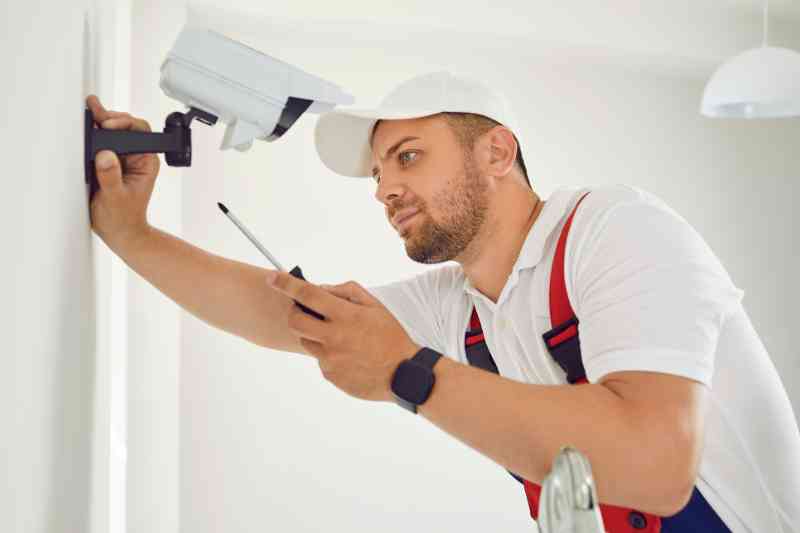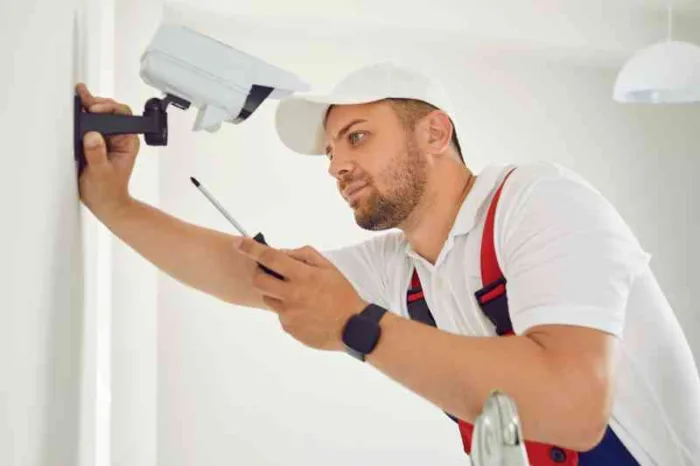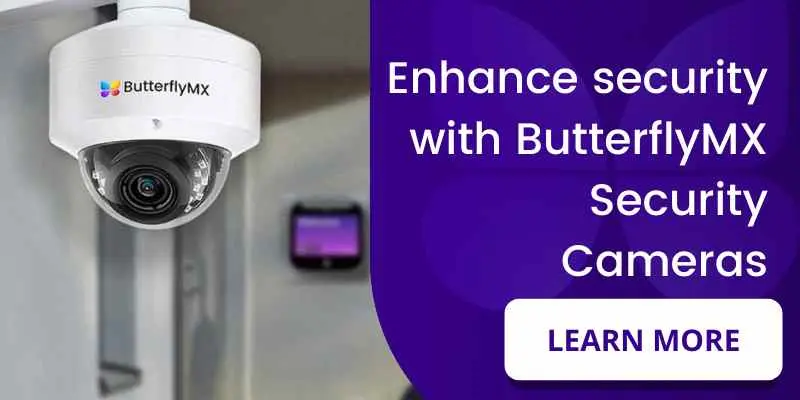Key takeaways
- Hiring a professional for your business security camera installation provides expert recommendations, quality installation, compliance with regulations, and more.
- Business security camera installation services include everything from initial surveys and equipment recommendations to installation and maintenance.
- The cost of installing cameras for your business depends on many factors, such as the number of cameras and the complexity of the installation.
- To find a professional installer, look at online reviews, seek recommendations, and contact the manufacturer for suggestions.
- Choose an installer who understands your security needs and works with the best security cameras on the market.

If you’re looking to boost your property’s physical security, choosing the right business security camera installation company is the first step.
Join us as we examine what a business security camera installer can do for your property. Then, we will explore different commercial security camera installation services and their costs. Finally, we will discover how to choose the best security camera installer for your business.
In this guide, we cover:
- Why hire a professional security camera installer?
- Business security camera installation services
- How much does it cost to install cameras in a business?
- How to find a professional security camera installer
- Installing a commercial security camera system
- The right security camera for your building
Why hire a professional security camera installer?
Installing security cameras is a crucial step in securing your property. While it may be tempting to handle this task yourself or enlist your on-site maintenance team, hiring a professional security camera installer offers several benefits.
Hire a professional security camera installer for the following advantages:
- Expert recommendations. Professional installers provide great insight and knowledge into the latest security camera systems and best practices. As a result, they’ll help you find the best system for your needs while also installing the system in the most optimal way to maximize its effectiveness. For example, they can help you determine what camera models are best suited for outdoor areas or which video management system is best for your type of property.
- Quality installation. Security camera installers ensure your cameras are installed at the optimal height and angle to minimize blind spots as best as possible. They’ll also calibrate your cameras so that you get clear footage of activity occurring within your business.
- Compliance. Security camera systems may be subject to local regulations and building codes, so it’s important to hire an installer who is knowledgeable about these laws. That way, you can maintain a compliant security system and business that doesn’t draw legal scrutiny.
- Support and maintenance. Installation is only one aspect of your security camera system. Installers also provide support and maintenance long after installation, prolonging the life of your security system.
- Valid warranty. Manufacturers train and educate installers on how to install their security systems. Therefore, many require professional installation to ensure the warranty remains valid.
Business security camera installation services
Business security camera system installation services play a pivotal role in your system’s planning, deployment, and maintenance.
Whether it’s protecting your physical assets, ensuring employee safety, or monitoring for unauthorized access, security camera installation provides a crucial layer of protection for your property.
Let’s take a closer look into common commercial security camera installation services:
- Initial survey and building assessment
- Equipment recommendations
- Installation
- Maintenance
- System upgrade and customization
Initial survey and building assessment
The best security camera companies for businesses thoroughly assess your property.
In these assessments, security professionals take into account important factors like your property’s layout, size, and existing security measures. Most importantly, your installer will work with you to ensure your business complies with local and federal regulations and building codes.
Compliance with regulations such as GDPR (General Data Protection Regulation) and FIPS-compliant cryptography ensures that your system meets high data security standards. These regulations protect individuals’ privacy and sensitive information that surveillance cameras may capture.
Additionally, local regulations usually have specific requirements regarding camera placement, signage, and data storage policies. So, by choosing compliant cameras, you reduce the risk of fines, lawsuits, or potential damage to your reputation resulting from non-compliance.
Equipment recommendations
Professional installers possess extensive knowledge of different camera types, brands, and features. They select the most suitable equipment for your property based on this knowledge.
By leveraging their expertise, installers are able to consider factors like scalability and compatibility with your existing infrastructure to provide recommendations that align with your long-term security goals.
Here are the factors your installer will consider when recommending equipment:
- Types of business or industry
- Number of cameras
- Types of cameras
- Camera placement and coverage
- Integrations
- Budget
- Compliance
- Scalability
- Storage needs
- Lighting
Installation
Expert installation ensures that cameras are properly configured and integrated with your network connections and monitoring software. So, by choosing the right installer, you can avoid common issues like incorrect placement, wiring issues, or compatibility problems.
Furthermore, high-quality installations ensure seamless integration with your IT network infrastructure and data management systems, offering you access to live surveillance feeds remotely.
Maintenance
Ongoing maintenance is important for keeping your security camera system in good condition. Professional installers can provide regular maintenance when necessary, such as assisting with troubleshooting, repairing hardware, replacing faulty components, and performing routine inspections.
Pro tip: Reduce necessary maintenance by investing in cloud-based security cameras so that they can receive updates and new features remotely.
System upgrades and customization
As your security needs evolve, you’ll need to meet changing security requirements and adapt to emerging technologies. Whether it involves expanding coverage, integrating with new technologies, or enhancing analytic capabilities, the ability to customize and upgrade your system allows you to tailor your security solution to your unique needs.
How much does it cost to install cameras in a business?
The cost of business security camera installation depends on these key factors:
- Number of cameras. Depending on the size of your property and your specific security needs, you’ll need a wide range of camera types to monitor activity at your property.
- Your infrastructure. Every business is different, so choosing a security solution completely tailored to your property is crucial.
- Installation costs. Installation costs can vary widely depending on the sophistication and complexity of your system.
- Operating and maintenance costs. To maintain the quality of your investment, it’s essential to stay up-to-date with ongoing maintenance, upgrades, and cleanings.
How to find a professional security camera installer
Finding a reliable and skilled security camera installer is crucial for ensuring that your security system is set up correctly and performs as designed.
So, here are some tips to help you find a professional installer:
- Research reputation. Search online to get a sense of the reputation security camera installers have near you. Look over online reviews, service descriptions, and the installer’s website, and reach out to ask for references. These different perspectives will give you a better feel for their capabilities.
- Ask for recommendations. Reach out to other business owners or operators in your network to ask for recommendations. Their personal experiences can provide you with valuable insights and help find a trustworthy security camera installer.
- Contact manufacturers. If you already know which security camera system you want, reach out to the manufacturer for help. Many security camera manufacturers have lists of certified or recommended installers as a part of their security camera partner programs to ensure you get the best possible install.
- Request multiple quotes. Obtain quotes from several installers to compare pricing and services. This allows you to assess the value offered by different professionals and make an informed decision based on your budget and needs.
- Verify credentials. Ask for the installer’s license, insurance, and background in commercial security camera installations. Moreover, check their portfolio or case studies to see their previous work and verify their expertise.
Installing a commercial security camera system
The best way to install a commercial security system is by contacting an installation company. Typically, they can provide you with the best service and recommendations.
Professional security system installation and other hardware installation comes with a lot of benefits. Many access control systems and hardware require manufacturer certifications before you’re allowed to install them.
Here’s a hands-on look at the installation process so you understand what installers are doing on your property and how you can help.
Here’s what you need to know about commercial security system installation:
- Picking the right hardware. Whether you’re installing a key, a lock, or an intercom, today’s access control market lets you pick between dozens of hardware options. Depending on the needs of your property and where the hardware will be located, you can start narrowing down the list and pick the hardware that will serve you best.
- Installing. The type of equipment you choose has a large bearing on how easy or hard the commercial security system installation will be. To install a wired intercom or keypad, you’ll have to rip up walls and floors just to lay wiring. On the other hand, wireless hardware saves you that headache.
- Testing the system. When you’re testing your commercial security system, make sure you do a thorough job. Ensure the wiring is connected correctly and that different alarms and sensors work as they’re supposed to.
- Adding users. So, your system is fully set up and tested. Now, you’re ready for building residents to start using the security system. In addition to standard users, it’s also important for you to add administrators. They will have the power to add residents, remove them, and edit resident permissions. Typically, you or a trusted staff member will act as an administrator.
The right security camera for your building
ButterflyMX’s Bullet and Dome Cameras offer quality cameras for indoor and outdoor camera use and will easily increase your ability to gain insights around your building.
Our Security Cameras feature:
- Remote access. With ButterflyMX, you’re never too far from your building. Our Cameras offer robust remote access features, allowing you to view live footage or playback recorded video from virtually anywhere when paired with our OS.
- ONVIF compatibility. With ButterflyMX, you can pair your existing ONVIF-compatible cameras with our Gateway to connect them to the ButterflyMX OS. The ButterflyMX Gateway supports a wide range of ONVIF cameras so that you can manage them remotely from the same dashboard that also manages your other ButterflyMX products.
- 24/7 HD video recording. ButterflyMX Cameras are equipped with high-definition (HD) that capture clear and detailed video footage. Whether you’re looking for more visibility at your building entrance or a more complex area like a hallway, the HD video ensures that every detail is visible.
- Weather resistance. Our Cameras are designed to withstand harsh weather conditions — making them perfect for areas like parking lots, industrial properties, and multifamily buildings. So, you can trust that your cameras will continue working in rain, snow, or intense heat.

Learn more about ButterflyMX
Fill in the form below, and we'll email you right back.
Have questions?
Fill in the form below, and we'll email you right back.






